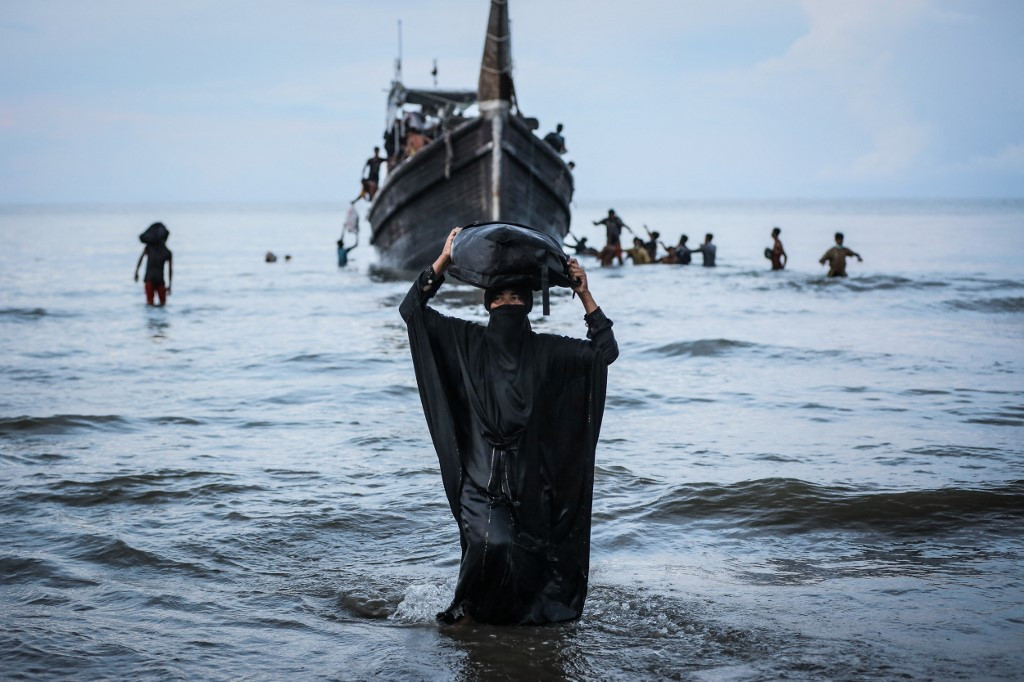Popular Reads
Top Results
Can't find what you're looking for?
View all search resultsPopular Reads
Top Results
Can't find what you're looking for?
View all search resultsTime to sign refugee treaty
Despite not being a party to the 1951 Geneva Convention Relating to the Status of Refugees, Indonesia has always been welcoming refugees and asylum seekers.
Change text size
Gift Premium Articles
to Anyone
T
he recent arrivals of Rohingya refugees fleeing from Myanmar have, surprisingly, been met by opposition from local people in Aceh. On previous occasions, the Acehnese warmly welcomed the Rohingyas on humanitarian grounds, and to a degree in the name of Islamic brotherhood.
It seems the Acehnese welcome has worn thin.
For many years the Rohingyas have landed and being accommodated in several places in the country’s westernmost province. Some of them have given their hosts a headache, such as absconding from their shelters, committing petty crimes and even getting involved in human trafficking.
Despite not being a party to the 1951 Geneva Convention Relating to the Status of Refugees, Indonesia has always been a welcoming refuge for asylum seekers.
Back in the late 1970s, at the end of the United States’ misadventure in Vietnam, there was a mass exodus from the former South Vietnam of people escaping the new communist regime. Indonesia provided Galang Island in Batam, then under the central government’s direct authority, to house those boat people awaiting resettlement in Western countries.
About 250,000 Vietnamese refugees lived in the refugee camps, which were jointly administered by the Indonesian government and the world refugee body, the UNHCR, on the island from 1979 to 1996.
After that, Indonesia again tackled a new wave of refugees from Afghanistan and Iraq, who fled their homes following the US invasions. Many of the refugees are still awaiting resettlement in Western countries, which by now seem reluctant to receive more asylum seekers, especially after the Russian invasion of Ukraine last year.
Western countries’ reluctance hardened following the 2012 Syrian civil war, citing incompatibility in cultures and values as reasons to reject refugees from the Middle East.
As of May, the UNHCR recorded more than 12,000 refugees sheltering in Indonesia awaiting their resettlement process.
Despite its limitations Indonesia has tried its best to accommodate the refugees, who mostly come from Muslim-majority countries.
Having no obligations at all under international law to host refugees, Indonesia sees its responsibility lying in the second principle of its ideology Pancasila: A Just and Civilized Humanity.
With a weaker economy and a high unemployment rate, Indonesia has done much more than some signatories, for example Australia, which keeps turning back boats fully loaded with refugees trying to reach its shores.
Australia even intervened by offering fishermen in East Nusa Tenggara a change in profession in a pre-emptive effort to cut the transportation link from Indonesia.
Many Western countries have pushed Indonesia to sign and ratify the 1951 UN convention, to transfer their responsibilities onto Indonesia, making it this country’s official burden to receive the refugees, despite the refugees not wishing to stay here.
Similar criticism is also thrown at the Bali Process, which has become a target for destination countries to avoid their responsibilities and shift them onto the transit countries.
However, as Indonesia’s economy has improved, signified by its return to middle-income nation status and its plan to join the Organisation of Economic Cooperation and Development (OECD), the government should rethink its refusal to sign the 1951 convention.
Not only because Indonesia has sufficient resources to host the refugees, despite the fact that almost none of them want to settle here, but allowing refugees to stay will allow us to claim the higher moral ground vis a vis Western countries.
Indonesia has simply to walk the talk.
The second principle of Pancasila on humanitarianism justifies Indonesia’s decision to accept the refugees, which is also in line with the preamble of the 1945 Constitution, which says: “to participate toward the establishment of a world order based on freedom, perpetual peace and social justice.”
Accepting refugees, however, would not abolish the need to solve the root cause of any conflicts that cause the exodus.
Nevertheless, it would show Indonesia’s seriousness in helping to alleviate the refugees’ burdens while at the same time working on peaceful solutions in their home countries.











